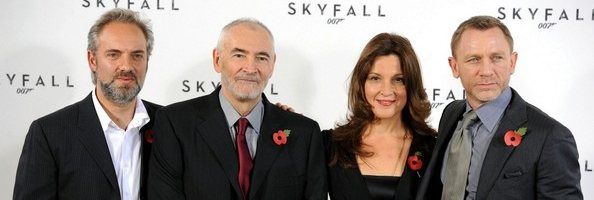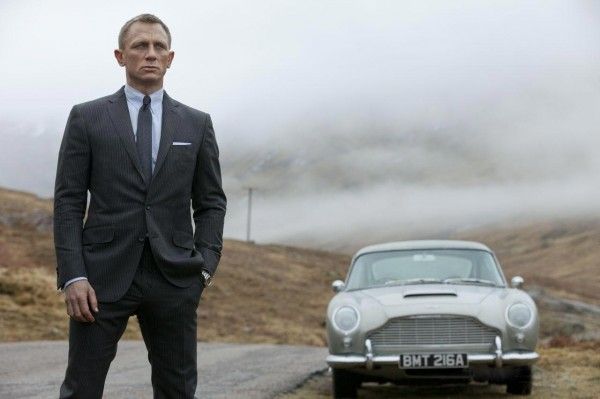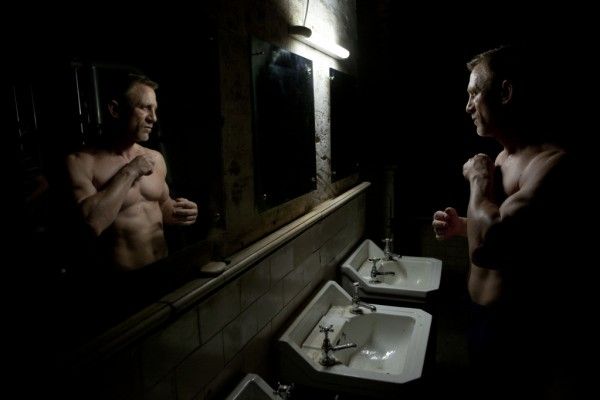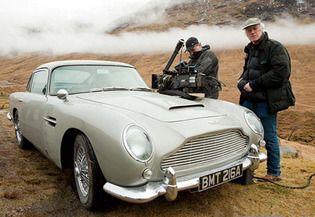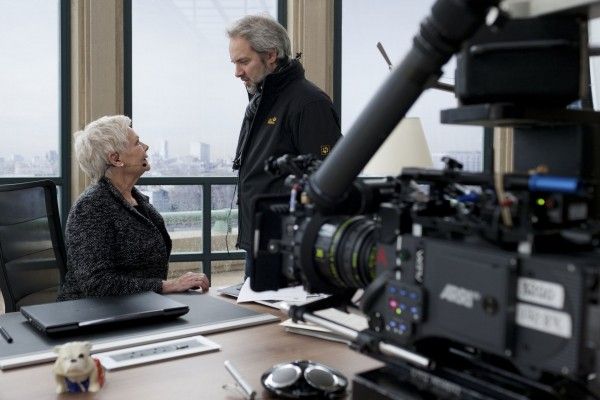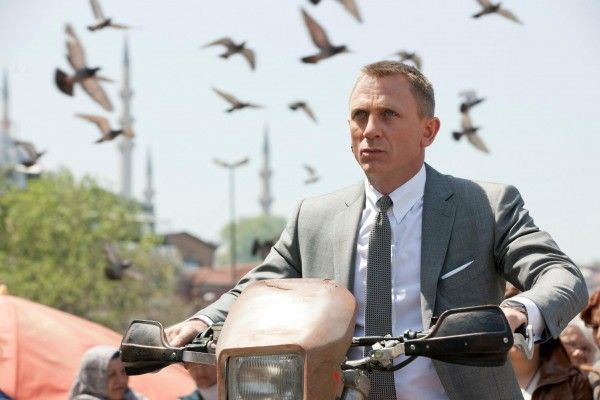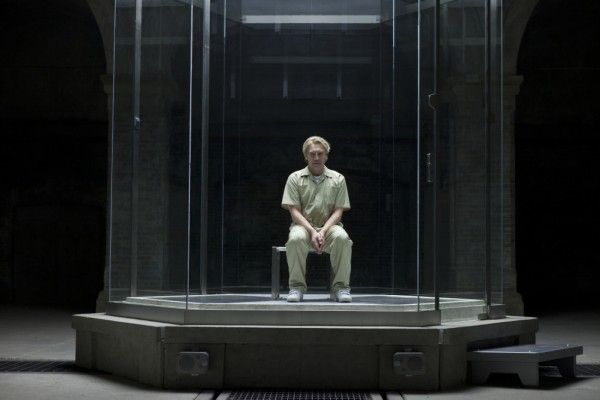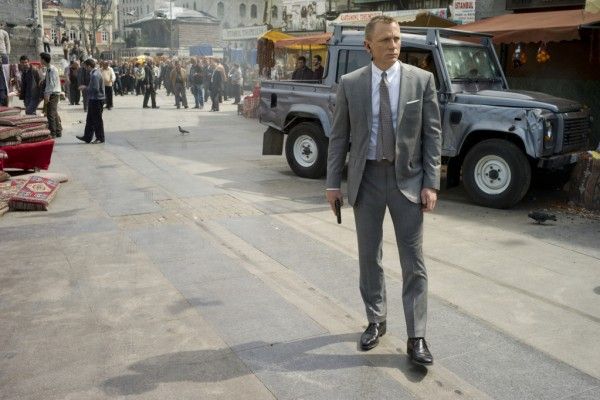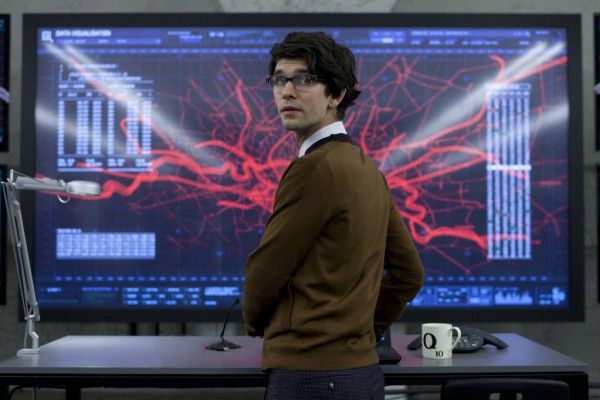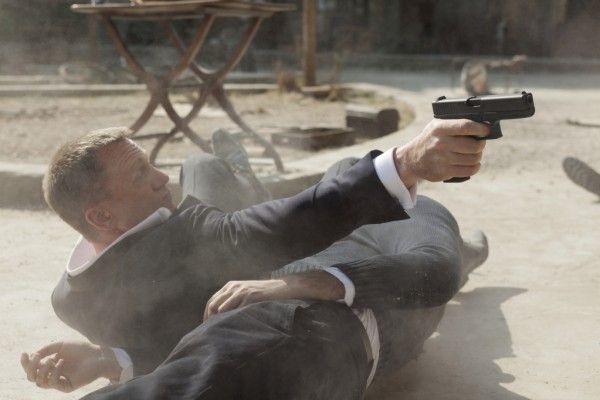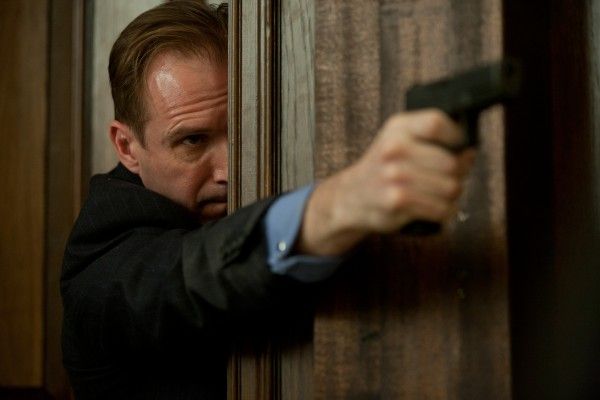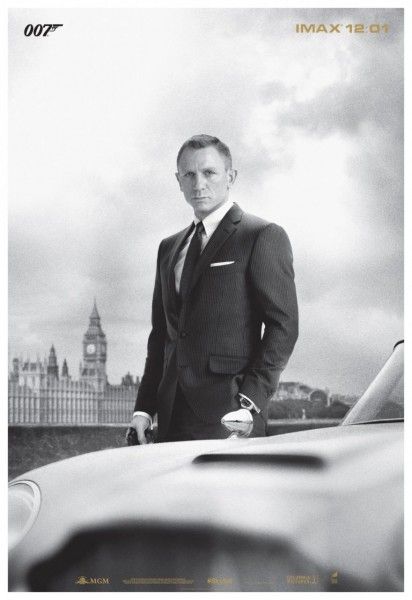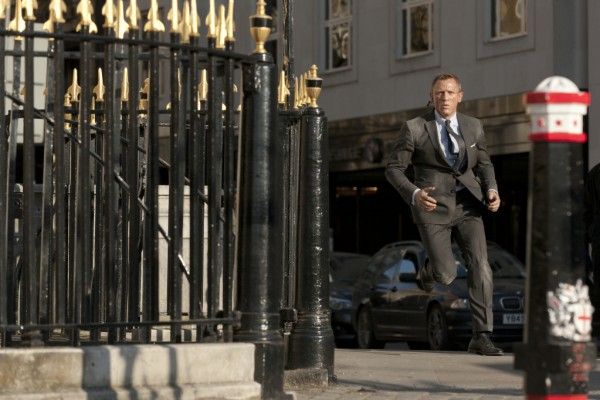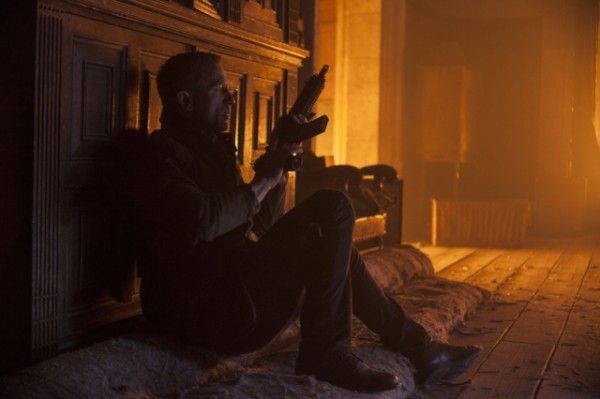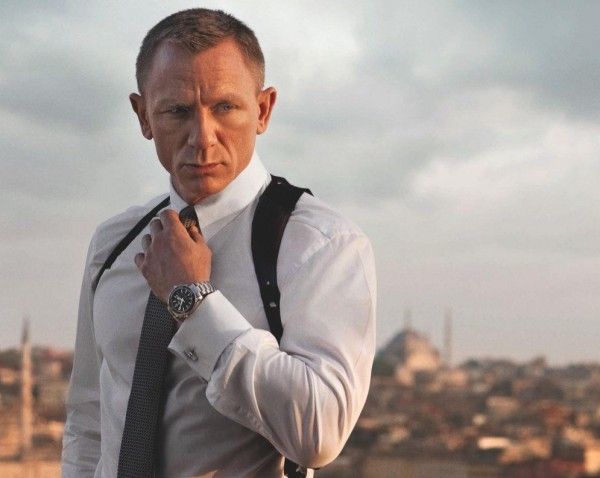Bond is back with a bang in Skyfall, a smart, sexy, exciting action thriller that’s one of the best 007 films ever, ranking right up there with From Russia with Love, Goldfinger, and On Her Majesty's Secret Service. It’s certainly the best of the Daniel Craig Bond films with its thrilling chase and fight sequences and the visceral way it reveals the vulnerable man behind the myth who relies on primal instincts and physical prowess to combat 21st century techno-terrorism.
At the Los Angeles press day for the film, Daniel Craig, director Sam Mendes, and producers Barbara Broccoli and Michael G. Wilson discussed how Skyfall presented an opportunity to continue to regenerate the franchise and introduce new characters, how they wrote the role of the Bond villain specifically for Javier Bardem, why Mendes was drawn to directing the film, what inspired his decision to cast Bérénice Marlohe, how DP Roger Deakins contributed to the extraordinary look of the movie, and why after five decades Bond is still such a potent franchise. Craig also talked about what he’s learned from doing an action movie and working with Dame Judi Dench whom he considers an extraordinary woman and actress. Hit the jump for what they had to say.
Question: Was there ever a discussion of including Felix Leiter in this story? Maybe the CIA had something to say about this NATO list of exposed operatives?
Sam Mendes: That’s the kind of conversation we had actually. “Does the CIA have any opinion?” Yeah, we did our best to include everybody, and we did actually talk about trying to get him in, but we just couldn’t find a way into this particular story, but I think he’s very much still around as a character, isn’t he?
Barbara Broccoli: He is and we’d love to get him back.
Daniel, when we spoke for Casino Royale you said you had to earn moments like “shaken not stirred” or “Bond James Bond.” What gave you the indication you’d earned it?
Daniel Craig: I just felt that given the great opportunity to do Casino, which the conceit was that we’re discovering the character, that we couldn’t just cram in the old gags. It would’ve felt wrong, and I was not trying to copy anybody who’d come before. They did it so well, and I didn’t want to be that person. I wanted to be me in this, but it’s always been a plan. It’s always been somewhere we’ve wanted to get to, and to try to put them back into the movie in an original, fresh way was just the only issue and the thing Sam and I spoke at length about, because we wanted to make a Bond movie. Eventually, a Bond movie is a Bond movie because of those things. I don’t know if I’ve earned it or not yet.
Mendes: This is really worth saying that we couldn’t have made this movie without Casino Royale. What they did and what Martin Campbell did so brilliantly in that film was bring everything back down to sea level and take away pastiche and the assumption that there were going to be those moments. Now we’re able to reintroduce them with a sense of fun and mischief. He can’t say this, but he has earned it actually. He’s earned it by telling those stories again up to this point. Now I think an audience is delighted when they reappear hopefully.
Sam and Daniel, why do you think after five decades Bond is still such a potent franchise?
[Both point to Barbara and Michael.]
Craig: No, no, that’s the reason. These two are the reason here.
Mendes: Easy answer.
Craig: To me, it’s a very easy answer. It’s retaining what it always had. It’s making movies for the audience, putting it all on the screen, and this family is the reason for it.
Broccoli: Because they want to be on the next, don’t they?
Craig: I’m just trying to keep my job. It’s hell, you know.
Mendes: You watch these little mini documentaries about the movie going on the DVD or whatever and sometimes you learn, even though you’ve been involved in them yourself, you learn some things actually. There was an interview with Michael and he said, “The old adage if it ain’t broke, don’t fix it is a recipe for disaster.” I thought he was going to say, “If it ain’t broke, don’t fix it is true.” The truth is he’s right, but it takes a hell of a courageous person or two people to know that actually what you’ve got to do is keep changing it and not making it the same. I think that has been ultimately the reason it’s regenerated so brilliantly is taking the risk on somebody like Daniel, taking the risk to take away everything in order to rebuild it, and that’s why it endures, because it’s not the same. Every Bond is different and every generation needs a different Bond and it’s been able to move with the times. Now it’s hopefully set up, we’d like to think, for another 50 years and to a whole other generation of people. So let’s see how they do.
Broccoli: Thanks a lot for leaving us with that thought.
Daniel, what was your most memorable moment in this film?
Craig: God, there were many. The thing that stays with me most is not really any particular thing, but the fact is walking onto the set with the cast that we had and Sam at the helm and a crew who you did pay good money for, but they were all there and everybody was excited and enthusiastic about making this film. That enthusiasm was infectious. That really, for me, is my abiding memory.
Was there one particular moment that was the most dramatic or frustrating?
Craig: Every day.
Mendes: It was all of those things.
Craig: All of those things. It was romantic and frustrating. It’s seven months of filming, so it’s like making four movies at the same time. There’s a second unit going on, there’s the main unit. We’re shooting action sequences, we’re shooting dialogue sequences, underwater sequences. There’s nothing like it. It’s a real privilege and an honor just to be around that.
The film looks beautiful. I’d like to attribute some of that to Roger Deakins. What was his reaction when he got the job?
Mendes: I’d like to attribute it to Roger Deakins as well. He contributes what a great cinematographer contributes, which is an unbelievable eye, an extraordinary skill in lighting, an immense amount of work in prep, huge care and dedication from day minus 100 all the way through to the last day of timing which is only a couple of weeks ago. He’s a very shy man and he expresses himself through his work. You put Roger with a camera to his eye and point him in the direction of something interesting and he’s a very happy man. He’d be shooting now if we hadn’t stopped. He would be. He’d be still going. He’s one of the greats, so for me, it’s a privilege to have him on the movie and to give him sequences, and like Daniel says, you’re making four movies and every section of the film feels so distinct from the other, feels so alive, it kind of regenerates in front of your eyes really, the film.
Craig: He has incredible consistency in his work. I noticed that while watching it. Especially on a movie this size, his assurety, and you feel like it’s a Sam Mendes movie but you feel like it’s a Roger Deakins movie as well. It’s a real stamp and it’s not intrusive. It’s just very magical.
Aside from the obvious, what in particular drew you to Skyfall?
Mendes: What’s the obvious, Daniel Craig? An enormous amount of money? Financial gain? That was it. Well, I wanted to have a huge challenge and there was no question, they don’t come much bigger than Bond in terms of scale and expectation. I wanted to wake myself up, try something completely new. I also wanted to come back to England to make a movie. I’d never made a move in England bizarrely, despite the fact that I’m English. And I wanted to work with Daniel and Judi Dench again who I hadn’t worked with for a while. So all of those things, it just felt like the right thing at the right time. It was a great piece of timing, but what I didn’t know is I was going to have two producers who were going to encourage me in a way to make something that was as personal for me as all the other things I’ve done. My only concern going in was, was I going to make a movie by committee? They have an amazing way of guiding you without seeming to guide you which is the art of a great producer.
Craig: At gunpoint.
Mendes: The guns only came out halfway.
Now that you’ve done three movies, you’re the master of Bond and action.
Mendes: He’s master of the universe I think.
What did you learn about doing an action movie? Do you find the moments you can be relaxed or lose the leash?
Craig: Look, it’s a combination. Action movies live and die by the story that you’re trying to tell. It’s hard. It’s very difficult to do an action movie that stays engaging. More often there’s a split between the two. You get an explosion and a bit of dialogue as it goes about. Sam put a huge amount of hard work into retaining the story that it’s told all the way. When you do that, doing the action makes all the sense in the world. Suddenly I’m on top of the train driving through the Turkish countryside and it makes sense. But I know what’s happening. I know what’s happening next. I know where the story’s going and I’m clear. So it gives it a huge amount of freedom and I get a kick out of it. I don’t do all my own stunts. I’d be lying if I said that, but I like the fact that occasionally you’ll see it on screen and it’s my face and it’s me. I think audiences hopefully appreciate that. At least, I hope they do.
Barbara, you’re credited as keeper of the flame of the Bond franchise. Is it a burden of responsibility?
Broccoli: Well, we keep the flame together, Michael and I. I always say that we’re like two halves of the same brain. I think it’s first and foremost for Cubby who was our mentor and for the audiences. They’re the people that have kept these movies going for 50 years because they come with a lot of good will. Also to the extraordinary people who have been making these films with us all through the years. Skyfall is a wonderful achievement thanks to Sam and Daniel who’s a magnificent Bond. So I think we do it for all of those reasons and it doesn’t feel a burden at all. It’s a huge privilege to get up in the morning and go to work with Daniel Craig and Javier Bardem. I will include you, Sam. He always says, “You never include me.”
Mendes: She lists all these sexy men. She gets down to Ben Whishaw, then she gets to Albert Finney and then there’s a silence. And?
Broccoli: And wonderful and sexy Sam Mendes. I don’t know if you want to add more to that, Michael.
Michael Wilson: It’s a great privilege and you do feel a certain responsibility to the audiences not to let them down. That’s part of the challenge. You want to give them something they expect, but also surprise them in a way they didn’t expect.
Are the literary fans and movie fans all one group now? Or is there still a difference?
Wilson: It’s very much a movie fan base in our world. There is a literary base, but I think it overlaps from what I can tell.
Javier Bardem does such a great job. Daniel, you were great in that scene with him.
Craig: That’s all. Just that one.
Broccoli: Just that one scene.
Craig: All the rest...
Mendes: Less than perfect.
Craig: I’ll take it.
No, you were great.
Craig: No, no, they’re just being mean.
Mendes: I was privileged to be able to work on the script from the ground up. The script didn’t exist when I came on and we did literally say, “Who would you most want to see as a Bond villain?” And we all said “Javier Bardem,” including Daniel and Barbara and Michael, everybody. We did write the role for him. However, that’s happened a lot in history, and the person you write it for ends up not doing it. But I could honestly say to him when I called him and sent him the script, “We wrote this part for you.” But I don’t think anyone imagined he would take it into the particular area that he took it. How he looks, how he moves, everything is a truly original creation but built on top of a very, very solid and excellent script by Rob (Robert Wade) and Neal (Purvis) and John Logan. But he brought his own particular brilliance to it as well, and the scene you talk about was my favorite experience in the movie. It was just watching the two of them. Because there was an enormous amount of mutual respect, but there’s also a huge amount of mischief and fun in the scene, and I think you feel it on screen, too. It gives me great pleasure that, at the end of a movie, people want to talk as much about that scene as they do about any of the action scenes, and ultimately it’s a six-minute dialogue sequence in which two people barely move. It proves that movies like this don’t all have to be rushing around and explosions, that you can have a balance of the two things as long as you have actors who are capable of doing it, and I was lucky enough to have two of them.
Craig: I was tied to a chair.
Mendes: And he was tied down.
Craig: I couldn’t move.
How much did you actually shoot on location in Shanghai vs. on a set at the studio?
Mendes: Well, it was inspired by Shanghai and our three visits to Shanghai, but we built that set on the 007 stage in Pinewood. In order to get it right, we had to build the entire set in miniature two months before, which we did, including all the LED screens which were designed by the graphics department and every pane of glass. And we shot it with a lipstick camera and watched the way the reflections behaved and planned it that way. As much as one can do, you prep so that when the actors walk onto the stage at Pinewood, you’re able to say, “This is how it’s going to be. This is where you’re going to move. This is your journey.”
Craig: It went so smoothly.
Mendes: Then you can say, “I don’t want to do that. I want to go over there.” And also, you watch people one by one walking into panes of glass, including me. It was a brilliant set, but that comes down to Dennis Gassner as well, the production designer. So you could say that it was heavily inspired by Shanghai, but in order to get it exactly as we wanted it, we had to build it.
Did you ever consider a Chinese girl for Bérénice’s role?
Mendes: Bérénice, absolutely, I considered every possible person for that role, but she came in and that particular mixture that she has of east and west, a mix of French and Cambodian and just general excellence as an actor and her sex appeal and all of those things, it was not a difficult decision. Once she came in, it was pretty clear that the part was hers.
What were the pre-production discussions about merging old and new Bond?
Craig: Extensive. I mean, nonstop and nonstop throughout the whole filming process. We knew we wanted to do something along those lines, but it’s very easily said, but it’s difficult to put into practice. It takes a lot of talented people to get that right. As I said earlier, you want to do it with a freshness, with a new eye, with something that satisfies.
Mendes: Everything has to be workshopped as an idea. Would you consider having Q back? Yes. For a while, he was an older man and then the idea came up he could be a younger man. Oh, that’s interesting. Let’s run with that and let’s see where we get to. It’s the same with everything. It just becomes something we all discuss amongst ourselves. One of the people, who was in a way the most important is not sitting here, was John Logan who came in and was very clear sighted, was very quick to get all our ideas and get them on paper, because until they’re on paper, they’re meaningless. It’s just a bunch of people sitting in a pub talking about the James Bond movie you’d want to see.
Craig: We do that as well though.
Mendes: Luckily, the tapes don’t exist of those conversations. Yeah, it needed that clarity of vision and it really did help gel all of those things.
In Skyfall, it’s less glitz and glam and a vulnerable James Bond. Did you come in with that direction, Sam?
Mendes: There were two locations that I think I was aware were not going to be, as you say, glitz and glam. One was London and the other was Scotland, and they both, for me, are incredibly evocative and very powerful poetic landscapes if you get them right, and we worked very hard to give them real specific atmosphere. There’s the rainy mystery of the London underground and all that stuff and creating a world of MI6 that was underground because London’s actually not, I don’t think, a particularly photogenic city. It’s quite difficult to shoot in an interesting way. Scotland the same, is potentially very bleak but very beautiful landscape, un-Bond-like. It’s fair to say that the point about locations in a Bond movie is to try and find a reason why you’re there that isn’t just the way it looks, that it has a reason and a story. In this case, it was to do with Bond’s emotional state most of the time
We went places that meant something to him. Even when you go to Shanghai, the kind of weird modernist slightly alienating landscape is where Bond is at that moment. He’s detached. He’s not sure whether he should be going back to doing what he’s doing again and there’s something inhuman about it the way we shot it. So there’s a reason for those things that isn’t just hmm, what would look beautiful? What would look nice? But what means something in the story? That’s the key, I think. When he, as it were, gets his mojo back, you find him going back into that classic Bond world, the casino, those beautiful reds, the richer colors, gold and what have you. It’s almost like he steps back in time and he’s back in the tux and he’s fully shaved. That’s where he is emotionally on a journey at that point, so we try as much as possible to make the locations mean something other than just the way they look.
Can you talk about the added IMAX element?
Mendes: I don’t think it was different for anyone really. We shot digital on the Alexa, the Arri Alexa, and we didn’t shoot it with an IMAX camera and so were able to use full frame IMAX aspect ratio and open it up when we needed to. I think one of the things that Roger and I were amazed by was how good it looked. I thought we were going to have to shift back and forth between 2.35 widescreen and opening up the frame for certain sequences, and it turned out that we did the whole movie that way. It wasn’t entirely planned. We were aware of the framing when we were doing it, but I am delighted with how it looks in IMAX and how it sounds in IMAX. It’s fantastic and I certainly will be attempting to do it again, although maybe not with chamber dramas.
Do you see more in the IMAX frame?
Mendes: Yeah.
Wilson: We frame it for 1.90 normally even when we’re shooting 2.35 because for television so you don’t have to pan and scan. So he did that for most of the scenes, but then when we looked at it, we could project it in 1.90 in IMAX and it still looked great, so it was fantastic.
Daniel, do you dread the potential call one day that they’re moving on with Bond?
Mendes: He can’t wait. Are you kidding? He’s desperate for the call.
Craig: No, look.
Broccoli: He’ll be waiting a long time.
Craig: I get a huge kick out of doing this and I can see doing another film. The whole point of this is they take such a chunk out of your life. I’m contracted to two, by the way, which is fairly common.
Broccoli: At least two.
Craig: That’s not what it says.
Broccoli: At least two.
Craig: I can see the next one. Beyond that, there’s so much work involved, bringing it together. I’d love to do another movie. That’s what I’m trying to say in a very roundabout way.
Broccoli: At least two.
Can you talk about working with Judi Dench? This is the most time you’ve spent with her character.
Craig: It was about time she did some work because she normally just sits in an office on the phone shouting at people. She’s an extraordinary woman, actress, just wonderful to be with. I keep saying this but when Judi walks into the room, she lights the room up. It’s incredible. She’s got such an energy about life and she loves doing what she does. For me, I’ve been a fan of her all my life so to get the chance to work with her and play with her, because that’s what she likes doing. She likes playing on set. She takes her job very, very seriously but laughs all the time.
When you found out the direction of the story, what were your initial thoughts?
Craig: I’ve got to be careful here. We don’t really want to give it away. I certainly don’t want to give it away. I know it’s out, but some people haven’t seen it yet. It made sense. It made a lot of sense and it gave us a chance to use her in a proper way. It was very emotional.
What about the idea of doing another film, or two films?
Broccoli: At least two films.
Craig: See what I have to put up with? You don’t know the half of it.
How much is Skyfall a set up for the next film or two?
Craig: It’s a happy accident if it’s a setup. I mean, genuinely, I think so. I think by introducing some new and old characters, I think we have.
Mendes: I agree. I think it’s one of those things that just sort of organically emerged. For me, one of the things that I’m most delighted by when people see it is they come out saying, “I can’t wait to see what happens next,” and that’s saying a lot for a 50-year-old franchise when you’ve just sat through two hours and 20 minutes of movie to say, “I want to see what’s going to happen next with this set of characters.” So obviously, it’s turned out, in a way, a new beginning. That can only be a good thing, but I don’t think we sat around trying to work it out. It just emerged organically like that as we worked on it.
Is there a vision for the next film?
Broccoli: No. I mean, we just finished this movie. October 8 was the first time we actually got to see this movie. And the next at least two that Daniel’s going to do - -
Craig: Jesus Christ.
Broccoli: I’m sure he’ll take us to a new place.
How big a decision was it to have Bond cry?
Craig: He doesn’t cry. He’s sweating.
Isn’t that the 10 commandments of Bond?
Craig: Well, then we broke them. Of course we did. That’s what we’re supposed to do. You’re supposed to mess around with it. It’s interesting. Literally you said he cries, other people I’ve heard say he doesn’t cry. It’s open but it’s an emotional scene. It’s worth it. It‘s worth it to play with that emotion. It’s not extraneous. It makes sense in the story, as far as I’m concerned anyway.
How did you strike a balance between the current Bond who operates in a world where his enemies are often unknown and the Bond of an earlier era?
Mendes: I think it’s like any big choice when you’re directing. It’s a huge series of decisions that if you’re in the right zone, it’s unconscious. First of all, you have to ask what’s right for the story and you can’t impose things, but you’re also aware that whenever you can have a moment where you can use a little twist on a familiar---whether you can see the martini being shaken, he doesn’t have to say “Shaken not stirred,” he can say “It’s perfect.” That, to me, is a good example of something that those who are going to see it will see it and those who don’t, it’s just a new part of the scene so it feels organic. For me, the great line in the movie is when he meets Q for the first time and he says, “So why do you need me?” Q says, “Every so often a trigger has to be pulled.” And Bond says, “Or not pulled. It’s hard to know which in your pajamas.” For me, that basically encapsulates the film. There is a serious point about the need for people who actually have human contact with other people and that cannot and will not refuse to communicate only by computer and that the end of the world is drones. That’s the end of the world, some kid in Vegas operating a drone while simultaneously doing a video game and taking people out of the field. There is a strong argument for the need for people to understand when or when not to pull the trigger. That’s a serious point, but then you made that within a movie that has all sorts of entertainment in it. The two things can be combined and that’s what’s possible to do now, I think.
Barbara and Michael, you’ve had success on stage with Chariots of Fire and Chitty Chitty Bang Bang.
Broccoli: Once.
Craig: And A Steady Rain.
Broccoli: A Steady Rain, we got him on the stage.
What about James Bond as a play?
Craig: A musical. I see a musical.
Broccoli: He doesn’t sing.
Craig: No, not even slightly.
Are the movies a source for stage material?
Broccoli: I think we’ve got our hands full making these as movies without going into taking them onto the stage, so I don’t think we’ll be doing that any time soon.
Daniel, what was it like working with the Queen on the Opening Ceremony for the Olympics?
Craig: Working with the Queen, I liked that. Look, I got to play a very small part in the Opening Ceremony of the Olympics in London. That’s for me a real honor, and the fact that we did that was just very surreal and extraordinary. There’s not a lot to say. I would be breaking state secrets.
Was your gun barrel walk different this time?
Craig: It was a little more relaxed maybe. That’s the point.
Roger Moore had nothing but glowing praise for you.
Craig: Oh, lovely, I’m a huge fan of his.
Click here for all our Skyfall coverage.

